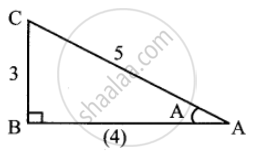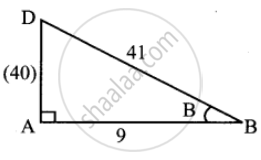Advertisements
Advertisements
प्रश्न
If sin A = `3/5` and cos B = `9/41 0 < "A" < pi/2, 0 < "B" < pi/2`, find the value of sin(A + B)
उत्तर

sin A = `3/5`
`0 < "A" < pi/2`
From ΔABC, AB = `sqrt(5^2 - 3^2)`
= `sqrt(25 - 9)`
= `sqrt(16)`
= 4
cos B = `9/41`
`0 < "B" < pi/2`
From ΔBAD, AD = `sqrt(41^2 - 9^2)`
= `sqrt((41 + 9)(41 - 9))`
= `sqrt(50 xx 32)`
= `sqrt(100 xx 16)`
= `sqrt(10^2 xx 4^2)`
= 10 × 4
= 40
Now,
From ΔABC, sin A = `3/5`, cos A = `4/5`
From ΔABD, sin B = `40/41`, cos B = `9/41`
sin(A + B) = sin A cos B + cos a sin B
= `(3/5 xx 9/4) + (4/5 xx 40/41)`
= `27/205 + 60/205`
= `187/205`
APPEARS IN
संबंधित प्रश्न
Find the values of `sin (-(11pi)/3)`
Find the value of the trigonometric functions for the following:
sec θ = `13/5`, θ lies in the IV quadrant
If sin x = `15/17` and cos y = `12/13, 0 < x < pi/2, 0 < y < pi/2` find the value of sin(x + y)
Expand cos(A + B + C). Hence prove that cos A cos B cos C = sin A sin B cos C + sin B sin C cos A + sin C sin A cos B, if A + B + C = `pi/2`
If a cos(x + y) = b cos(x − y), show that (a + b) tan x = (a − b) cot y
If tan x = `"n"/("n" + 1)` and tan y = `1/(2"n" + 1)`, find tan(x + y)
If cos θ = `1/2 ("a" + 1/"a")`, show that cos 3θ = `1/2 ("a"^3 + 1/"a"^3)`
Prove that cos 5θ = 16 cos5θ – 20 cos3θ + 5 cos θ
Prove that `32(sqrt(3)) sin pi/48 cos pi/48 cos pi/24 cos pi/12 cos pi/6` = 3
Express the following as a sum or difference
sin 35° cos 28°
Express the following as a product
cos 65° + cos 15°
Express the following as a product
sin 50° + sin 40°
Show that sin 12° sin 48° sin 54° = `1/8`
Prove that `(sin 4x + sin 2x)/(cos 4x + cos 2x)` = tan 3x
Prove that `sin theta/2 sin (7theta)/2 + sin (3theta)/2 sin (11theta)/2` = sin 2θ sin 5θ
If A + B + C = 180°, prove that cos A + cos B − cos C = `- 1 + 4cos "A"/2 cos "B"/2 sin "C"/2`
If ∆ABC is a right triangle and if ∠A = `pi/2` then prove that cos2 B + cos2 C = 1
If ∆ABC is a right triangle and if ∠A = `pi/2` then prove that cos B – cos C = `- 1 + 2sqrt(2) cos "B"/2 sin "C"/2`
Choose the correct alternative:
If cos 28° + sin 28° = k3, then cos 17° is equal to
Choose the correct alternative:
If `pi < 2theta < (3pi)/2`, then `sqrt(2 + sqrt(2 + 2cos4theta)` equals to
